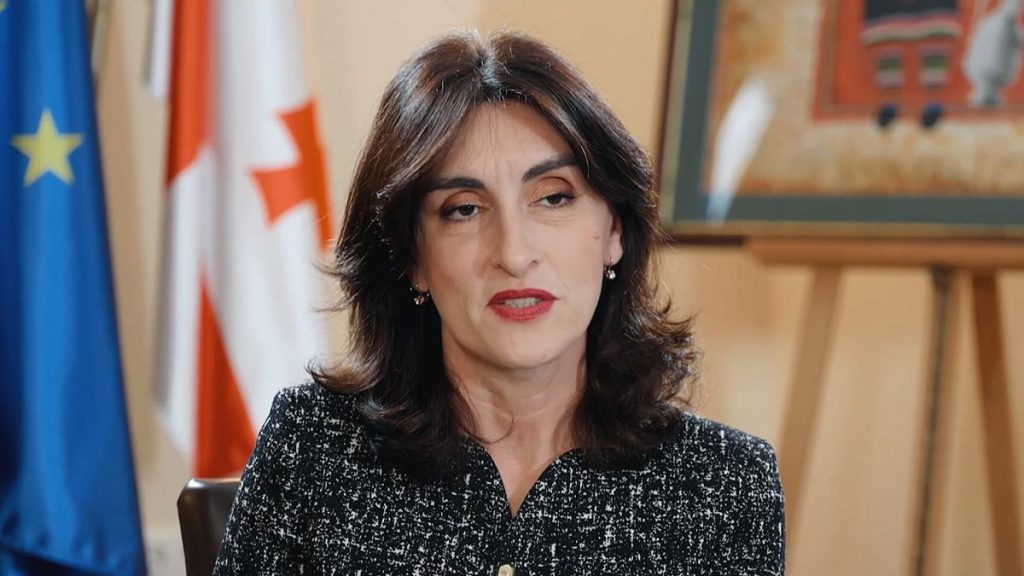Paragraph 1: Introduction and Initial Impressions
Georgian Minister Maka Botchorishvili, in a recent interview, addressed a range of critical issues facing her nation, including its territorial integrity, aspirations for EU membership, and responses to recent protests and criticisms. Just weeks into her tenure, Minister Botchorishvili acknowledges the considerable challenges confronting Georgia, particularly the ongoing occupation of 20% of its territory by Russia. She emphasizes the government’s commitment to restoring Georgia’s territorial integrity through peaceful means and a policy of reconciliation. This complex situation necessitates careful navigation and dedicated efforts to represent Georgia accurately on the global stage.
Paragraph 2: The Russian Occupation and Relations with Ukraine
The Minister underscores the enduring challenge posed by the Russian occupation, a persistent issue since Georgia’s independence. This military presence creates significant security vulnerabilities for the nation. While Georgia remains committed to a peaceful resolution, the lack of diplomatic relations with Russia since the 2008 invasion precludes direct communication with Russian counterparts. Addressing criticisms from Ukrainian President Volodymyr Zelenskyy regarding Georgia’s alleged dependence on Russia, Minister Botchorishvili dismisses these claims as speculation. She asserts that the ruling Georgian Dream party has consistently acted against Russian interests during its 12 years in power, and attributes such accusations to a simplistic, binary view of international relations that unfairly labels nations as either pro-Russian or anti-Russian. She reiterates Georgia’s steadfast support for Ukraine.
Paragraph 3: Domestic Protests and the EU Membership Bid
The interview delves into the recent protests sparked by the Georgian government’s decision regarding its EU membership bid, a decision that garnered international criticism. Minister Botchorishvili clarifies that the government did not suspend the European integration process or negotiations, as formal negotiations had not yet commenced. She maintains that the right to protest should be exercised peacefully and points to violence perpetrated by certain protest groups against police forces, resulting in numerous injuries. She calls for a balanced condemnation of violence from all sides involved. The Minister acknowledges the difficulties in the current EU-Georgia relationship, particularly in light of the controversial foreign influence law.
Paragraph 4: The Foreign Influence Law and EU Relations
Minister Botchorishvili defends the foreign influence law, emphasizing its focus on transparency regarding foreign funding in Georgia. She argues that the legislation aims not to impede civil society organizations but rather to establish clarity regarding the sources and purposes of foreign funds, serving as a preventive measure against negative foreign influence. This transparency, she asserts, is crucial for Georgia’s stable democratic development. She acknowledges that this issue has contributed to strained relations with the EU but emphasizes the importance of mutual trust and open communication to address concerns and move forward. The Minister rejects the notion that the law signals a shift away from Europe and towards Moscow, arguing that it is purely a matter of internal transparency.
Paragraph 5: Public Opinion and Georgian Dream’s Commitment to European Integration
Acknowledging widespread public support for EU and NATO membership within Georgia, Minister Botchorishvili underscores the Georgian Dream party’s commitment to these aspirations. She highlights the government’s track record in implementing reforms, positioning Georgia as a frontrunner in its association with the EU. The Minister cites Georgia’s participation in various EU-led missions as further evidence of its commitment to shared values and partnership with Europe. She attributes the deterioration of relations with the EU to a broader pattern of criticism targeting Georgia, beginning around 2020 and intensifying following Russia’s invasion of Ukraine in 2022. She argues that criticisms regarding Georgia’s response to the war, including its decision not to impose sanctions on Russia, often overlook the unique security challenges and vulnerabilities faced by the nation.
Paragraph 6: Georgia’s Desire for EU Membership and the Path Forward
Finally, Minister Botchorishvili addresses the fundamental question of Georgia’s genuine desire for EU membership. She cites both emotional and practical reasons for this aspiration. The emotional connection stems from a historical and cultural affinity with Europe, reflected in the strong public support for integration. Practical considerations include Georgia’s complex geopolitical situation and the benefits of belonging to a union that upholds human rights, fosters economic development, and offers a stable and prosperous future. While acknowledging the current challenges in the relationship with the EU, the Minister expresses optimism that these obstacles can be overcome through continued dialogue, mutual understanding, and a commitment to shared values. She concludes by emphasizing the importance of building trust and working together to achieve Georgia’s European aspirations.

